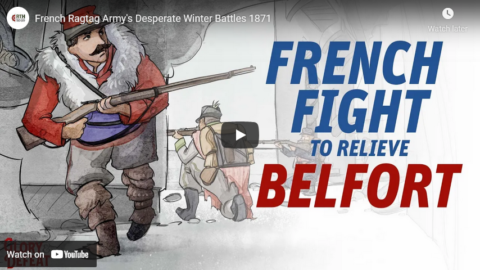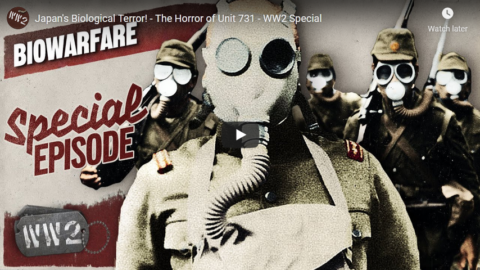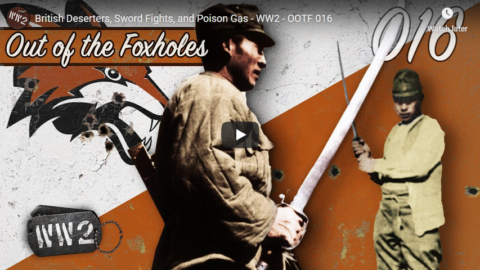This week, we’re going to talk briefly about why “we” – and by “we” here, I mean the top-tier of modern militaries – have generally eschewed the systematic or widespread use of chemical weapons after the First World War. And before you begin writing your comment, please note that the mountain of caveats that statement requires are here, just a little bit further down. Bear with me.
Now, when I was in school – this was a topic I was taught about in high school – the narrative I got was fairly clear: we didn’t use chemical weapons because after World War I the nations of the world got together and decided that chemical weapons were just too horrible and banned them, and that this was a sign of something called “progress“. In essence, the narrative I got was, we had become too moral for chemical weapons and so the “civilized” nations (a term sometimes still used unironically in this context) got together and enforced a moral taboo against chemical (and biological) weapons. And, we were told (this was, I should note, the late 90s and early aughts, long before the Syrian Civil War) that this taboo had mostly held.
Which was important, because in this narrative as it was impressed upon that younger version of me, the ban on chemical weapons showed the path towards banning all sorts of other terrible weapons: landmines, cluster-munitions and of course most of all, nuclear weapons. All we would need to do is for the “civilized” nations of the world to summon the moral courage to abandon such brutal weapons of war. Man, the end of history was nice while it lasted! But the example of the “successful” ban on chemical and biological weapons was offered as proof that the dream of a world without nuclear weapons was possible, if only we showed the same will.
When I was a child, I talked like a child, I thought like a child, I reasoned like a child. When I became a man, I put away childish things. But what was my teacher’s excuse? I guess the end of history was a hell of a drug.
[…] all three of these answers (including my high school answer) actually miss the point, because they all assume something fundamental: that chemical weapons are effective weapons, and so the decision not to use them is fundamentally moral, rather than practical.
Quite frankly, we don’t use chemical weapons for the same reason we don’t use war-zeppelin-bombers: they don’t work, at least within our modern tactical systems.
Bret Devereaux, “Collections: Why Don’t We Use Chemical Weapons Anymore?”, A Collection of Unmitigated Pedantry, 2020-03-20.
August 7, 2022
QotD: The post-WW1 experiment in banning chemical weapons
January 7, 2022
French Ragtag Army’s Desperate Winter Battles 1871
Real Time History
Published 6 Jan 2022Support us on Patreon: https://patreon.com/realtimehistory
One of the last bastions of French resistance in the new year 1871 is Belfort. A ragtag army called “Army of the East” rushes to free the city near the Swiss border. Meanwhile the Germans prepare to announce their Empire in Versailles.
» THANK YOU TO OUR CO-PRODUCERS
John Ozment, James Darcangelo, Jacob Carter Landt, Thomas Brendan, Kurt Gillies, Scott Deederly, John Belland, Adam Smith, Taylor Allen, Rustem Sharipov, Christoph Wolf, Simen Røste, Marcus Bondura, Ramon Rijkhoek, Theodore Patrick Shannon, Philip Schoffman, Avi Woolf» OUR PODCAST
https://realtimehistory.net/podcast – interviews with historians and background info for the show.» LITERATURE
Arand, Tobias: 1870/71. Der Deutsch-Französische Krieg erzählt in Einzelschicksalen. Hamburg 2018Buk-Swienty, Tom: Schlachtbank Düppel. 18. April 1864. Die Geschichte einer Schlacht. Berlin 2011
» SOURCES
Klein, Karl: Fröschweiler Chronik. Arand, Tobias/Bunnenberg, Christian (Hrsg.). Hamburg 2021.Allorant, Salomé u.a. (Hrsg.): La République au défi de la guerre. Lettres et carnet de l’Année terrible (1870-1871). Amiens 2015
Fontane, Theodor: Der Krieg gegen Frankreich. Bd. 4. Berlin 1876
Goncourt, Edmond de: Journal des Goncourts. II.1. 1870-1871. Paris 1890
Meisner, Heinrich Otto (Hrsg.): Kaiser Friedrich III. Das Kriegstagebuch von 1870/71. Berlin, Leipzig 1926
N. N. (Hrsg.): Bismarcks Briefe an seine Gattin aus dem Kriege 1870/71. Stuttgart, Berlin 1903
Pflugk-Harttung, Julius: Krieg und Sieg 1870-71. Berlin 1896
Sheridan, Philip H.: Von Gravelotte nach Paris. Erinnerungen aus dem deutsch-französischem Kriege. Leipzig 1889
Zeitz, Karl: Kriegserinnerungen eines Feldzugsfreiwilligen aus den Jahren 1870 und 1871. Altenburg 1905
» OUR STORE
Website: https://realtimehistory.net»CREDITS
Presented by: Jesse Alexander
Written by: Cathérine Pfauth, Prof. Dr. Tobias Arand, Jesse Alexander
Director: Toni Steller & Florian Wittig
Director of Photography: Toni Steller
Sound: Above Zero
Editing: Toni Steller
Motion Design: Philipp Appelt
Mixing, Mastering & Sound Design: http://above-zero.com
Maps: Battlefield Design
Research by: Cathérine Pfauth, Prof. Dr. Tobias Arand
Fact checking: Cathérine Pfauth, Prof. Dr. Tobias ArandChannel Design: Battlefield Design
Contains licensed material by getty images
All rights reserved – Real Time History GmbH 2022
February 24, 2021
Japan’s Biological Terror! – The Horror of Unit 731 – WW2 Special
World War Two
Published 23 Feb 2021As one of the few nations during World War Two, Japan made expensive use of biological and chemical weapons, both on and off the battlefield. Unit 731 is their special bio-warfare department, which conducts testing on living human civilians.
Join us on Patreon: https://www.patreon.com/TimeGhostHistory
Or join The TimeGhost Army directly at: https://timeghost.tvFollow WW2 day by day on Instagram @ww2_day_by_day – https://www.instagram.com/ww2_day_by_day
Between 2 Wars: https://www.youtube.com/playlist?list…
Source list: http://bit.ly/WW2sourcesHosted by: Spartacus Olsson
Written by: Joram Appel
Director: Astrid Deinhard
Producers: Astrid Deinhard and Spartacus Olsson
Executive Producers: Astrid Deinhard, Indy Neidell, Spartacus Olsson, Bodo Rittenauer
Creative Producer: Maria Kyhle
Post-Production Director: Wieke Kapteijns
Research by: Joram Appel
Edited by: Karolina Dołęga
Sound design: Marek KamińskiColorizations by:
– Daniel Weiss
– Mikołaj Uchman
– Dememorabilia – https://www.instagram.com/dememorabilia
– Klimbim
– Norman Stewart – https://oldtimesincolor.blogspot.com/Sources:
– National Archive NARA
– Imperial War Museums: D 3162, HU67224, HU 44941, Q 114057
– BundesarchivSoundtracks from Epidemic Sound:
– “For the Many STEMS INSTRUMENTS” – Jon Bjork
– “Weapon of Choice” – Fabien Tell.
– “Moving to Disturbia” – Experia
– “Symphony of the Cold-Blooded” – Christian Andersen
– “It’s Not a Game” – Philip Ayers
– “Please Hear Me Out STEMS INSTRUMENTS” – Philip Ayers
– “London” – Howard Harper-Barnes
– “Break Free” – Fabien Tell
– “Not Safe Yet” – Gunnar JohnsenArchive by Screenocean/Reuters https://www.screenocean.com.
A TimeGhost chronological documentary produced by OnLion Entertainment GmbH.
August 25, 2020
August 21, 2020
British Deserters, Sword Fights, and Poison Gas – WW2 – OOTF 016
World War Two
Published 20 Aug 2020What happened to deserters in the British Army? Did Chinese and Japanese troops ever engage in sword to sword combat? Why didn’t Germany use poison gas on the battlefield? Find out the answers to all these questions in today’s Out of the Foxholes!
Join us on Patreon: https://www.patreon.com/TimeGhostHistory
Or join The TimeGhost Army directly at: https://timeghost.tvFollow WW2 day by day on Instagram @World_war_two_realtime https://www.instagram.com/world_war_two_realtime
Between 2 Wars: https://www.youtube.com/playlist?list…
Source list: http://bit.ly/WW2sourcesHosted by: Indy Neidell
Written by: Rune Væver Hartvig
Director: Astrid Deinhard
Producers: Astrid Deinhard and Spartacus Olsson
Executive Producers: Astrid Deinhard, Indy Neidell, Spartacus Olsson, Bodo Rittenauer
Creative Producer: Joram Appel
Post-Production Director: Wieke Kapteijns
Research by: Rune Væver Hartvig
Edited by: Jakub Janiec
Sound design: Marek KamińskiColorizations:
Mikołaj UchmanVisual Sources:
Imperial War Museums: HU 762498, Q 79508, El Alamein 1942, E 18542, B5114, MH 26392, F2845,
Library of Congress
Antoine from Flickr.com
National Archives NARA
Bundesarchive
Narodowe Archiwum Cyfrowe
The icons from Noun Project by: Milinda Courey, Arthur Shlain, Delwar Hossain, ahmad, Muhamad Ulum, Rooty, Simon Child, carlotta zampini, Wonmo Kang, Vectors Point, EucalypMusic:
“Break Free” – Fabien Tell
“Ancient Saga” – Max Anson
“Defeated” – Wendel SchererArchive by Screenocean/Reuters https://www.screenocean.com.
A TimeGhost chronological documentary produced by OnLion Entertainment GmbH.
March 4, 2012
“Assuming this account is accurate, this was a war crime”
Heresy Corner on the story being serialized in the Daily Mail from Tony Banks:
Banks says that “we simply did not have the resources to take prisoners” and “they had started the war and they had not shown much respect for the white flag when they had shot my three mates who went forward to take the surrender at Goose Green.” Neither is an excuse recognised by the Geneva Convention.
To issue an order to take no prisoners is a fundamental violation of the principles of international law and thus a war crime. Section 40 of Additional Protocol I of the Geneva Conventions provides that soldiers who have clearly expressed an intention to surrender (for example by raising their arms or waving a white flag) are considered to be hors de combat and they must be given quarter (i.e. allowed to peacefully surrender). The officer who gave that order is not named but presumably Banks, along with other surviving members of his unit, knows who it was.
[. . .]
Assuming this account is accurate, this was a war crime. The fact that the Paras involved plainly knew that it was a war crime (hence the “brief argument”) exacerbates rather than mitigates their guilt. One soldier killed this boy in cold blood and the others covered up for him. That makes them all guilty, morally and legally. The fact that this took place thirty years ago is no reason why it cannot now be investigated and the perpetrators brought to trial. At the very least Banks should be taken in for questioning.
December 9, 2011
600 million “virtual war criminals” to be snagged in new virtual Geneva Convention
Look out FPS gamers — the Red Cross has you in their sights:
Move aside, Milosevic. Out of the way, al-Bashir. It’s the world’s videogamers who should be hauled up on war crimes charges, some members of the Red Cross seem to think.
During the 31st International Conference of the Red Cross and Red Crescent, which took place in Geneva last week, attendees were asked to consider what response the organisations should make to the untold zillions of deaths that can be laid at the feet of videogamers.
[. . .]
There is “an audience of approximately 600 million gamers who may be virtually violating international humanitarian law (IHL),” it noted.
The key word there, folks, is ‘virtually’. Ruthlessly gunning down civilians, fellow combatants and/or extraterrestrial visitors may be a crime if you do it for real, but not if you merely imagine the action, even if helped by the realistic visuals of the likes of Battlefield 3 and Call of Duty: Modern Warfare 3.
July 20, 2009
Oh, it’s okay . . . manufacturer claims the EATR is vegetarian
Take back all the panic-mongering in this post. Cyclone Power Technologies assures us that their battlefield robot (the disturbingly named EATR) is on a strictly no human corpses diet:
Many commentators, our own Lewis Page included, not unreasonably took this vague “biomass in the environment” concept to mean anything EATR could get its robotic claws on, including humans.
Some press reports went further, suggesting EATR would suck nourishment from corpses as it went about its unholy business.
Cue an entertaining press release (pdf) from Cyclone, which stresses that EATR is “strictly vegetarian”. The company explains: “Despite the far-reaching reports that this includes ‘human bodies,’ the public can be assured that the engine Cyclone has developed to power the EATR runs on fuel no scarier than twigs, grass clippings and wood chips.”
Cyclone marvellously adds: “Desecration of the dead is a war crime under Article 15 of the Geneva Conventions, and is certainly not something sanctioned by DARPA, Cyclone or RTI.”






